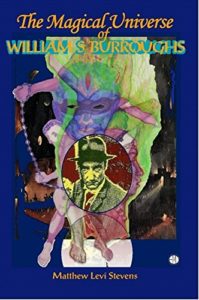
The Magical Universe of William S. Burroughs
Matthew Levi Stevens
Format: Softcover
ISBN: 978-1-906958-64-0
£15.00 / US$24.00
Subjects: Counter-Culture/Magic/Occult/Biography/American Underground.
Click HERE for The Magical Universe of William S. Burroughs / UK
Click HERE for The Magical Universe of William S. Burroughs / USA
Click here for Kindle UK Edition
Click here for Kindle USA Edition
“In the magical universe there are no coincidences and there are no accidents. Nothing happens unless someone wills it to happen. The dogma of science is that the will cannot possibly affect external forces, and I think that’s just ridiculous. It’s as bad as the church. My viewpoint is the exact contrary of the scientific viewpoint. I believe that if you run into somebody in the street it’s for a reason. Among primitive people they say that if someone was bitten by a snake he was murdered. I believe that.”
– William S. Burroughs
Fully revised and expanded from the limited edition chapbook that first appeared in 2012, The Magical Universe of William S. Burroughs is the first ever in-depth consideration of the significance of Magic and the Occult in the Life & Work of the writer and counter-cultural icon.
In Literary Outlaw: The Life and Times of William S. Burroughs, his biographer Ted Morgan wrote:
‘As the single most important thing about Graham Greene was his viewpoint as a lapsed Catholic, the single most important thing about Burroughs was his belief in the magical universe. The same impulse that lead him to put out curses was, as he saw it, the source of his writing…’
‘To Burroughs behind everyday reality there was the reality of the spirit world, of psychic visitations, of curses, of possession and phantom beings…’
From the Introduction to The Magical Universe of William S. Burroughs:
In talking about The Magical Universe of William S. Burroughs I am really thinking of two things:
Firstly, and probably most obvious, is the material that appears in the output of Burroughs the Writer that can be seen as describing or referring to some magical, mystical or occult idea – Invocations of Elder Gods of Abominations, descriptions of Sex-Magick rituals, references to amulets, charms, ghosts, omens and spells – all the thematic set-dressing that we all know and love, from Hammer Horror Movies to Weird Tales, from H. P. Lovecraft to Dennis Wheatley and The X-Files…
Secondly, there is the personal interest and involvement of Burroughs the Man with belief systems and practices that come from those strange ‘Other’ territories that lay outside the bounds of either conventional mainstream religion or scientific materialism – explorations of L. Ron Hubbard’s Scientology, Konstanin Raudive’s Electronic Voice Phenomena, Wilhelm Reich’s Orgone Accumulator; also partaking of the Vine-of-the-Soul with Amazonian shamans, attending the Rites of Pan in the Rif Mountains outside Morocco, participating in a Sweat-Lodge with Native American Indian medicine men – and, latterly, an engagement with that most Post-Modern of Occultisms, Chaos Magic.
The material considered has been distilled from archival sources, correspondence, interviews, and of course, published works. As well as his own personal contact with Burroughs and his lifelong study of the Man and his Work, the author also draws from a wide range of former associates – collaborators, friends, lovers, and students – including C. J. Bradbury Robinson, Michael Butterworth, David Conway, Phil Hine, Graham Masterton, Malcolm Mc Neill, and others.
As well as his own contact with the likes of Genesis P-Orridge, John Balance & Peter Christopherson of Coil, and writer Terry Wilson, back in 1980s London, he has also had unprecedented access to the papers of Cabell McLean, a young writer who was William’s companion, lover & student, c.1976-1983.
—
Sometime in the nineteen-seventies, following a reprint of my book, Magic: An Occult Primer, a letter was forwarded to me by my then publisher. Poorly typed and in an envelope which, unless my memory deceives me, bore no postage stamp, it came from William S. Burroughs. I still have it somewhere. In it the writer made plain his interest in magic. In real magic that is, not the smoke and mirrors kind.
Given that Burroughs’ tireless ambition was to encounter a reality beyond that accessible to our five senses, with magic perceived as an effective means to that end, it is remarkable that the subject has hitherto received but scant attention.
This work, by Matthew Levi Stevens, who must have encountered Burroughs at around the time he wrote to me, sets out to make up for that deficit. In it he chronicles the man’s interest and examines the part magic and occultism generally played both in his life and in his work.
Stevens sets about the task with gusto, indicative of his respect and, indeed, affection for “Uncle Bill”, as well as his familiarity with the topic itself. He draws on Burroughs’ own writings, and on those of the growing number of people, supporters and critics alike, who have commented on him and his literary output.
It is a job well done. And one that is all the more welcome because long overdue . . .
– David Conway, 2014.

